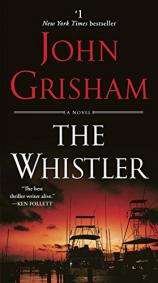The Whistler
Review
The Whistler
Over a publishing career spanning more than three decades, John Grisham refuses to allow his writing to be pigeon-holed into one distinct style. While his novels almost always are legal-themed, they cover a wide range of subjects and quite often are based on contemporary legal issues such as the death penalty, wrongful convictions, tort reform and the influence of money in judicial elections. Occasionally, he wanders far from the law with local flavor or sports-themed novels. He also has written six children’s books. Unlike many of his contemporaries, Grisham refuses to settle into a formulaic pattern with recurring characters and formats. Each of his books is unique, and is a new, enjoyable and scintillating reading experience.
"[A]s more pieces of the puzzle make the crime picture clear, Grisham moves to a rapid conclusion. The final 100 pages will hold your attention until the very end.... His themes and characters are always entertaining and thoughtful. THE WHISTLER is no exception."
In THE WHISTLER, Grisham has returned to a style reminiscent of his first successful novel, THE FIRM. He has written a straight-up mystery thriller that, although legal-themed, has little legal substance in its plot and structure. Granted, the central villain of the story is a Florida judge, and her bête noire is Lacy Stoltz, an attorney and investigator for the Florida Board on Judicial Conduct, assigned to review allegations of judicial misconduct. But the legal underpinning of the plot ends there, as there are no courtroom battles between lawyers and judges…just regular investigations that could be undertaken by anyone in law enforcement. This background is not offered as criticism. Grisham writes good basic mystery stories. His hook is the law, just as other mystery writers use horses, English country manors or street cops as theirs. It is the writing and the solving, not the genre, that make the mystery enjoyable.
Stoltz and her partner, Hugo Hatch, are experienced investigators. Their careers have taught them that most allegations against judges involve incompetence rather than corruption. When a previously disbarred attorney suggests to them that a Florida judge is deeply ensnared in a massive corruption case, allowing her to steal more money than anyone can imagine, they are skeptical. But the allegations have some substance. The judge, Claudia McDover, has assisted influential members of her community in the building of an Indian Reservation casino in her judicial circuit. Favorable rulings in lawsuits both civil and criminal have been rewarded by huge cash kickbacks to the judge. The disbarred attorney, now using the name Greg Myers, has a confidential source providing him with information on Judge McDover’s activities. In addition to her financial windfall, the judge aided a criminal prosecution in which a resident of the Indian community who led the opposition to the casino was falsely accused and convicted of a double homicide.
“Why not just contact law enforcement officials?” asks Stoltz. Myers, a convicted felon, does not trust law enforcement. More importantly, he has a larger motive. Under Florida law, if the corruption is exposed, he and his associates stand to gain a large financial reward as whistleblowers. Stoltz agrees to open and pursue an investigation, the subjects of which soon become aware that their finances and activities are under scrutiny. Some, being the criminals they are, react with violence. But Grisham, unlike other writers, does not resort to gun violence, car chases or superhero exploits by his characters. They are dogged investigators finding piece after piece of a complex puzzle. At times, the story moves very slowly, but as more pieces of the puzzle make the crime picture clear, Grisham moves to a rapid conclusion. The final 100 pages will hold your attention until the very end.
John Grisham has written 29 legal-themed novels. His followers may find this latest effort a little “light on the law,” but it is a fast-paced and well-plotted mystery that has a message for its readers. His themes and characters are always entertaining and thoughtful. THE WHISTLER is no exception.
Reviewed by Stuart Shiffman on October 25, 2016





